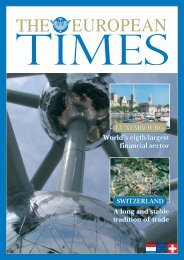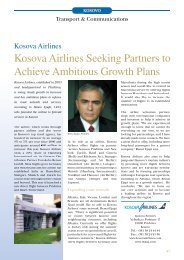Download Switzerland Report - The European Times
Download Switzerland Report - The European Times
Download Switzerland Report - The European Times
Create successful ePaper yourself
Turn your PDF publications into a flip-book with our unique Google optimized e-Paper software.
Canton of Zurich<br />
Incubator within Zurich’s Biotech Centre offers strong<br />
support for start-ups.<br />
Life Science Zurich project launched in 2001<br />
Factors behind success<br />
<strong>The</strong> success of the Canton of Zurich’s life sciences sector<br />
derives from a number of factors. <strong>The</strong>se include strong<br />
government support, a tradition of innovation, exceptional<br />
research and educational institutions, a highly developed<br />
healthcare sector, a tradition of close co-operation between<br />
research centres and the business sector, a strategic location<br />
in the heart of Europe and very high quality of life.<br />
<strong>The</strong>re are now more than 400 life sciences companies and<br />
institutes in the Greater Zurich Area, and more than 3,500<br />
researchers in life sciences are employed there. In addition,<br />
the Zurich Mednet project brings together local and international<br />
medical and biotech companies, universities,<br />
technical colleges and technology transfer institutions.<br />
Zurich’s universities have produced 22 Nobel Prize winners<br />
(three Nobel Prize winners still teach in the canton), and<br />
Zurich is particularly known for its innovations in life<br />
sciences. In 1977, at Zurich University Hospital, a balloon<br />
catheter was used for the first time in the treatment of a<br />
heart patient. This Zurich invention is now used worldwide<br />
on over a million patients every year. In the private sector,<br />
the Zurich firm Prionics developed a quick test to detect BSE<br />
(mad-cow disease), and between 2001 and 2003 Prionics test<br />
kits were used to test more than 18 million of the 30 million<br />
cows tested for BSE.<br />
Local firms such as Centerpulse, Phonak, Nobel Biocare,<br />
Tecan, Millenium Biologix and Biotronic all research,<br />
develop and manufacture in the Canton of Zurich,<br />
producing a range of cutting-edge items.<br />
Very successful biotechnology start-ups in Zurich include<br />
Cytos, Prionics, EsbaTECH, Glycart and <strong>The</strong> Genetics<br />
Company. One advantage new biotech companies in Zurich<br />
have is the city’s strong financial services sector. Companies<br />
in the Canton of Zurich have access to the funds required<br />
for all phases of company development, including obtaining<br />
seed and venture capital. In addition, the Life Science<br />
Key drivers in Zurich’s life sciences sector are the University<br />
of Zurich and the Swiss Federal Institute of Technology<br />
in Zurich (ETHZ), both of which are known for their<br />
stellar research activities. To spur on the development of<br />
the canton’s life sciences sector and enhance networking<br />
opportunities, the two institutions joined forces to launch<br />
the Life Science Zurich project in 2001. More than 90 institutes<br />
within the university (including the University Hospital<br />
of Zurich) and ETHZ as well as other life sciences organisations<br />
are working together in this innovative project.<br />
Strengthening ties between research centres and<br />
business<br />
Ensuring close ties between local research activities and<br />
the business sector is a top priority for Zurich’s life sciences<br />
leaders. As the mission statement of Life Science Zurich<br />
points out, “Research results from the University or the<br />
ETHZ that have economic potential should be economically<br />
exploited to the extent that this is possible. When there<br />
is an active partnership between science and the economy,<br />
ultimately both benefit.” <strong>The</strong> nonprofit Life Science Zurich<br />
Biotechnology Network helps to forge links between<br />
researchers and life sciences companies.<br />
<strong>The</strong> technology transfer services Unitectra und ETH-<br />
Transfer offer researchers comprehensive services in the<br />
entire process of economic conversion of research results,<br />
including arranging contracts with private economic<br />
partners (cooperation contracts, licenses) and ensuring the<br />
protection of intellectual property, for example in the form<br />
of patents.<br />
Support for spin-off companies<br />
In addition, they support the founding of spin-off<br />
companies based on local R&D. As Life Science Zurich<br />
points out, “Founders of a spin-off company have a head<br />
start in know-how that can be transformed into a market<br />
advantage, resulting in competitive products and services<br />
for which there is a demand.” Such spin-off companies can<br />
count on financial, infrastructural and consulting support<br />
during their first year of operations.<br />
<strong>The</strong> cantonal government actively encourages productive<br />
public-private partnerships in the life sciences sector. “We<br />
believe that Zurich’s life sciences sector will be internationally<br />
competitive very quickly and we welcome more international<br />
investment in this sector,” Dr. Thomas Heiniger<br />
concludes.<br />
63














